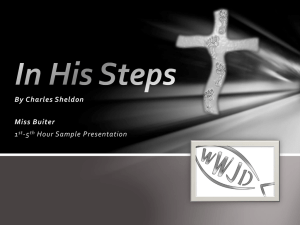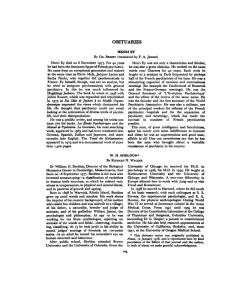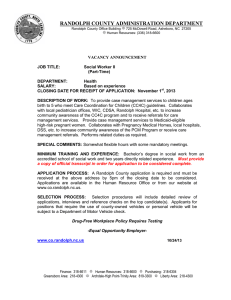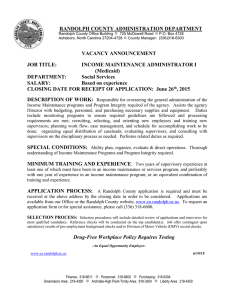Death to Smoochy
advertisement
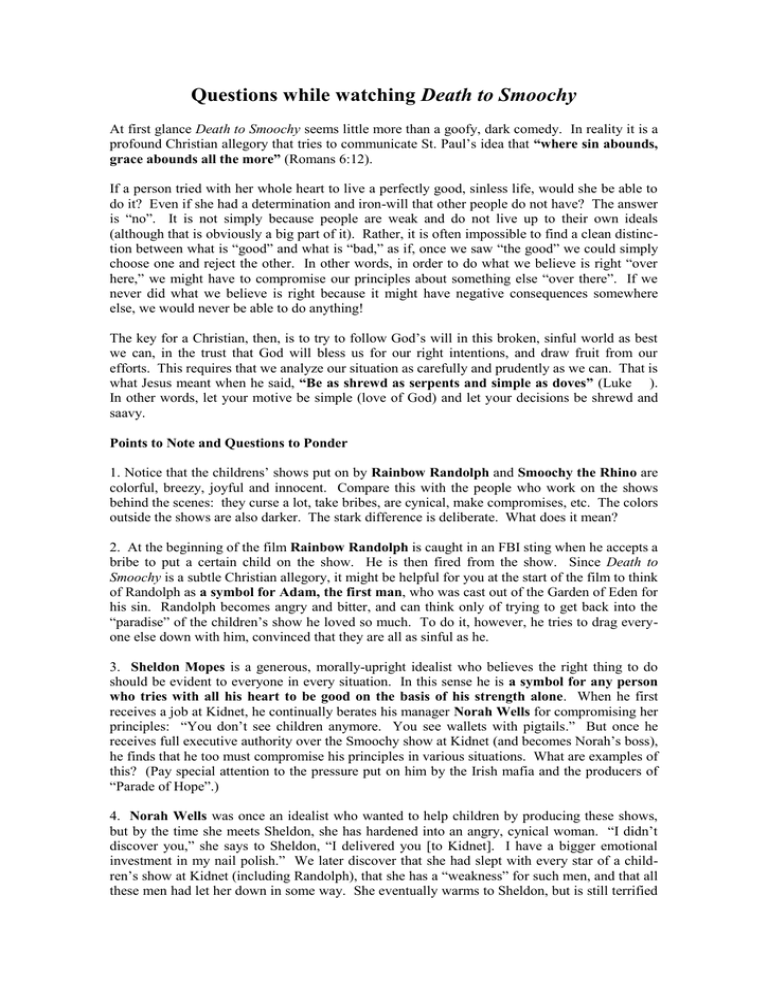
Questions while watching Death to Smoochy At first glance Death to Smoochy seems little more than a goofy, dark comedy. In reality it is a profound Christian allegory that tries to communicate St. Paul’s idea that “where sin abounds, grace abounds all the more” (Romans 6:12). If a person tried with her whole heart to live a perfectly good, sinless life, would she be able to do it? Even if she had a determination and iron-will that other people do not have? The answer is “no”. It is not simply because people are weak and do not live up to their own ideals (although that is obviously a big part of it). Rather, it is often impossible to find a clean distinction between what is “good” and what is “bad,” as if, once we saw “the good” we could simply choose one and reject the other. In other words, in order to do what we believe is right “over here,” we might have to compromise our principles about something else “over there”. If we never did what we believe is right because it might have negative consequences somewhere else, we would never be able to do anything! The key for a Christian, then, is to try to follow God’s will in this broken, sinful world as best we can, in the trust that God will bless us for our right intentions, and draw fruit from our efforts. This requires that we analyze our situation as carefully and prudently as we can. That is what Jesus meant when he said, “Be as shrewd as serpents and simple as doves” (Luke ). In other words, let your motive be simple (love of God) and let your decisions be shrewd and saavy. Points to Note and Questions to Ponder 1. Notice that the childrens’ shows put on by Rainbow Randolph and Smoochy the Rhino are colorful, breezy, joyful and innocent. Compare this with the people who work on the shows behind the scenes: they curse a lot, take bribes, are cynical, make compromises, etc. The colors outside the shows are also darker. The stark difference is deliberate. What does it mean? 2. At the beginning of the film Rainbow Randolph is caught in an FBI sting when he accepts a bribe to put a certain child on the show. He is then fired from the show. Since Death to Smoochy is a subtle Christian allegory, it might be helpful for you at the start of the film to think of Randolph as a symbol for Adam, the first man, who was cast out of the Garden of Eden for his sin. Randolph becomes angry and bitter, and can think only of trying to get back into the “paradise” of the children’s show he loved so much. To do it, however, he tries to drag everyone else down with him, convinced that they are all as sinful as he. 3. Sheldon Mopes is a generous, morally-upright idealist who believes the right thing to do should be evident to everyone in every situation. In this sense he is a symbol for any person who tries with all his heart to be good on the basis of his strength alone. When he first receives a job at Kidnet, he continually berates his manager Norah Wells for compromising her principles: “You don’t see children anymore. You see wallets with pigtails.” But once he receives full executive authority over the Smoochy show at Kidnet (and becomes Norah’s boss), he finds that he too must compromise his principles in various situations. What are examples of this? (Pay special attention to the pressure put on him by the Irish mafia and the producers of “Parade of Hope”.) 4. Norah Wells was once an idealist who wanted to help children by producing these shows, but by the time she meets Sheldon, she has hardened into an angry, cynical woman. “I didn’t discover you,” she says to Sheldon, “I delivered you [to Kidnet]. I have a bigger emotional investment in my nail polish.” We later discover that she had slept with every star of a children’s show at Kidnet (including Randolph), that she has a “weakness” for such men, and that all these men had let her down in some way. She eventually warms to Sheldon, but is still terrified that he will be the same. The question is, why would Norah have a weakness for these stars? (Think in terms of her “nature,” her ideals, which though badly wounded, still exists, even if she doesn’t know it.) Note also that she has red hair, which is a common symbol in film. Which woman from the Bible might she be intended to symbolize? 4. Another character in the film symbolizes the Devil. Who is he, and why? (Think in terms not only of what he says and does, but also how he is visibly presented in the film.) 5. Note that Spinner Dunn, an ex-boxer whose brain has been muddled by too many punches, might be a Christ-figure. Why? He loves Sheldon (a symbol of humanity at its best) so much that he puts on a rhino outfit just like Smoochy. As a result, he is accidentally shot in Sheldon´s place by those who were angered at Sheldon. In just the same way, God so loved us that he became one of us, and once in human form he died in our place, for our sins. Do you agree with this interpretation? Why or why not? 6. Sheldon is falsely accused of being a Nazi sympathizer and is eventually cleared. But there is evidence to suggest that this experience changed him dramatically. In one scene you see him eating something unusual for Sheldon. What is he eating, and why is it important? And again, once he vents his frustrations with the kids on the show by speaking frankly about his experience, he decides to go ahead and perform in the Parade of Hope, even though he had refused earlier. What caused him to change his mind? 7. What was it about Sheldon that continually provoked new waves of anger and resentment in Randolph? (Think about Randolph’s own frustrated desires.) Eventually, however, Randolph converts and saves Sheldon’s life. What caused Randolph’s change of heart? 8. At the end of the film Norah says to Sheldon, “Let’s go home, Smooch. The show is over.” But Sheldon replies, “No it isn’t. It’s just beginning!” We then see a new show, starring both Smoochy and Rainbow Randolph, and the show is far better than any of children’s show before it, with flying and soaring and Norah herself dancing between them. In terms of our Christian allegory, what does all this symbolize, theologically?

